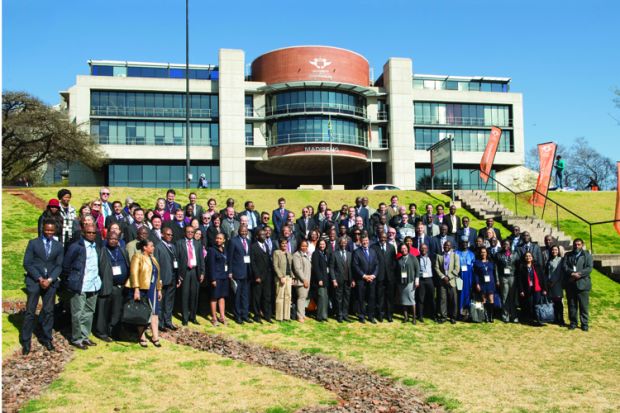African universities must “shun mediocrity” if they are to stem the brain drain of academic talent from the continent, a major conference hosted by Times Higher Education heard.
THE’s inaugural Africa Universities Summit, held at the University of Johannesburg on 30 and 31 July and attended by senior figures from universities and governments across the continent, heard that scholars who had moved to the West might be tempted to return if institutions improved academic standards, invested in facilities and prevented xenophobic violence.
Albert van Jaarsveld, vice-chancellor of the University of KwaZulu-Natal in Durban, said that institutions could not rely on goodwill alone.
“The important thing is to create the kind of environments that allow people to come back in a way that supports career development and enhancement in a positive fashion,” he said. “As long as there is a perception that circulation back to the African continent is somehow detracting from their career path, we are going to lose this fight.”
Faith Osier, a clinical research fellow at the health science programme run by the Kenya Medical Research Institute and the Wellcome Trust in the coastal town of Kilifi, said that African universities needed to “shun mediocrity” and ensure that senior academics were positive role models for their younger colleagues.
“When you come into a place, it is really important to see people who are achieving things,” Professor Osier said. “If you come into a place where people are dead wood, however brilliant you may be, you are going to become dead wood yourself.”
Dr van Jaarsveld said that it was not just about academic standards and career progression, however. In certain disciplines, particularly scientific ones, infrastructure and equipment played a key role.
As long as all the “cool toys” were located in the northern hemisphere, it was unlikely that scholars in these fields would base themselves in Africa, Dr van Jaarsveld said.
“We must have the cool toys in the southern hemisphere,” the vice-chancellor added.
Dr van Jaarsveld also expressed concern about attacks on foreigners in South African cities earlier this year. Xenophobia must be “stamped out in the university teaching environment” in future, he said, with institutions focusing on providing a cosmopolitan and welcoming atmosphere.
The same session heard that the movement of African academics around the world could be viewed in a more positive light.
Pius Adesanmi, professor of English literature and African studies at Carleton University in Canada, said that there had been a culture of almost “criminalising” the academic diaspora when he left Nigeria two decades ago.
The attitude in the west of the continent was “more dynamic” now, Professor Adesanmi said. He now returns to the region several times a year to develop courses, supervise doctoral candidates and to encourage students to stay in Africa.
Dr van Jaarsveld said that Africa had to become part of the global knowledge economy, and as such had to accept that there would be a “certain degree of circulation of talent” between the continent and the rest of the world.
Mobolaji Aluko, who returned from an academic career in the US to become the vice-chancellor of Nigeria’s Federal University Otuoke, said that it was important therefore to provide African academics who have worked overseas for a long time with opportunities to come back to the continent on a short-term basis, to see whether it was for them.
“We have to do some toe-poking before we dive into the swimming pool,” he said.




